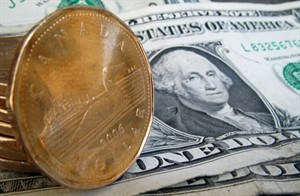
Canadian dollars, or loonies, sits on their American counterparts. THE CANADIAN PRESS/Paul Chiasson
December 16, 2013 - 2:00 AM
WASHINGTON - Loonie-loving Canadians might be bemused to learn that their American brethren suffered a setback last week in the long, unfulfilled quest to supplant the U.S. paper dollar with coins.
A U.S. Federal Reserve research paper panned the idea of eliminating that greenback in the latest phase of a debate that has continued, off and on, in the quarter-century since Canada ditched its own green buck.
That assessment was based on economic calculations.
"We believe that the $1 Federal Reserve note should remain in circulation and not be replaced with a $1 coin," said the working paper, released last week by three members of the Fed's board of governors.
"The real resource costs to produce $1 coins and private-sector costs to handle $1 coins exceed the costs to produce and handle $1 notes over 30 years, resulting in the all-$1-coin environment costing payment system participants significantly more than the current co-circulation environment."
Americans have had dollar coins, with special releases since the 1970s, but as they remain unpopular with everyday users the government has stopped distributing them and U.S. wallets remain stuffed to this day with the green, stony gaze of George Washington.
Still, the idea of a dollar coin manages to stir some people's passions.
In yet another time-honoured American tradition, competing industries have rallied around respective lobby groups to exert pressure on Capitol Hill.
On one side, it's the paper industry. On the other, it's the mining companies and vending-machine industry through their group, the Dollar Coin Alliance. The alliance offers a write-to-Congress function on its website where people enter their zip code and, presto, a letter supporting coin dollars instantly gets sent to their local representatives in the Senate and House.
The Dollar Coin Alliance was unimpressed with last week's report.
"The United States is virtually the only developed country to still use paper currency with such low purchasing power; a dollar bill today buys about what a quarter did in the 1970s," the group said.
It criticized the findings, saying they contradicted a string of reputable reports that touted billions in potential savings from a coin dollar. And it suggested the Fed might have an ulterior motive: fear of losing $2 billion per year if it's no longer in charge of issuing dollars. Responsibility for issuing coins belongs to another body, the U.S. Mint.
"They are practically alone in their opposition to a dollar coin, as nearly every industrialized economy in the world has transitioned its lowest denomination currency to a coin," said a statement from the alliance.
"This begs the question, why did the Federal Reserve feel compelled to spend seemingly hundreds of thousands of taxpayer dollars and countless staff hours producing a report that contradicts dozens of previous studies and common sense?"
It's actually up to Congress whether paper bills should be phased out, and legislation to that effect has been sponsored by several lawmakers including Sen. John McCain.
"We are not the decision makers," Fed spokeswoman Susan Stawick noted in an email. She added, however, that the body would be expected to weigh in on such a debate and said last week's paper was an attempt to do just that.
The Government of Canada has also waded into the discussion.
In testimony before Congress, a senior official at the Royal Canadian Mint described the country's long experience with coin dollars and its more recent move to multi-ply plated steel.
"Canadians have come to embrace the one-dollar coin, which they nicknamed the 'loonie' by virtue of its iconic bird design, and use it as they would any other coin," Beverley Lepine, the mint's chief operating officer, told a House of Representatives committee last year.
"In a June 2012 online poll conducted on the loonie’s 25th anniversary by the CBC, Canada's public broadcaster, almost 70 per cent of Canadians identified the coin as a recognizable symbol of Canada and many of those consider it a national icon equal to the beaver and Maple Leaf."
But the Federal Reserve report said the world has changed since Canada got its birdie-buck.
For starters, electronic payment systems have mushroomed at stores and vending machines. So past analyses on the long-term savings would, it said, have to be revised.
"Many other countries made their decisions to replace low-denomination notes with coins when electronic and other card payment substitutes for cash were less mature than today," the paper said.
"Canada replaced its lowest denomination note with a coin in 1987, Australia in 1984, and the United Kingdom in 1983. At that time, the number of electronic point-of-sale (POS) devices in those countries was virtually nonexistent... Current conditions in the United States, however, differ from those in other countries at the time of their transition efforts."
Also, paper money is now more sophisticated and lasts longer, the report said.
For those reasons, and others, the report concluded that the initial investment in more expensive, but longer-lasting, dollar coins would never be recouped to the point where it's financially viable.
The Canadian government doesn't sound convinced.
In any case, it certainly isn't planning to stop mass-producing gold-coloured bucks — just like the one famously planted beneath an American hockey rink before a Canada-U.S. Olympic final, and later shown to the world by a triumphant Wayne Gretzky.
"Although a bank note may be less costly to produce than a coin, the average life of a coin is about 20 to 30 years, resulting in considerable savings over a larger time horizon," a Finance Department official said in an email.
"There are no plans to revisit that decision."
News from © The Canadian Press, 2013